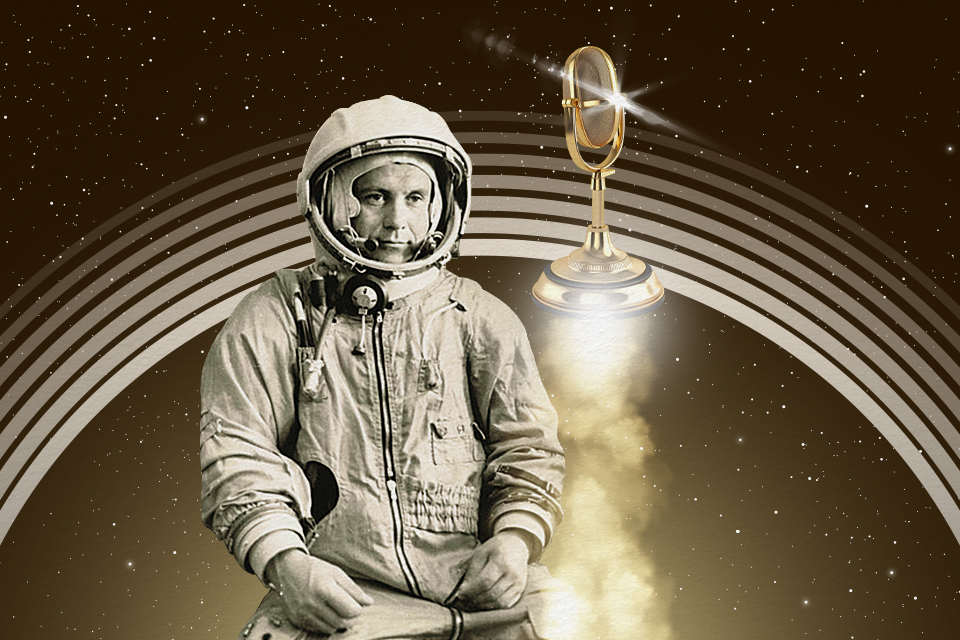Ukrainians are often called a “singing nation”, and evidence of this can be found in the most unexpected places. For example, it was Ukrainian Pavlo Popovych who became the first person to sing while in space. We hope that when the Cosmovision interplanetary song contest is organised, it will be dedicated to our compatriot. In the meantime, let’s recall some little-known details of his biography and also about some other space performers.

The first resident of the Star City
Pavel Popovich truly occupied a special place among the first Soviet space explorers, and not only because he was almost a fellow countryman of Chief Designer Sergei Korolev. It so happened that he became the first resident of the Star City, — the settlement near cosmodrome where the Cosmonaut Training Centre was located. He met all those who arrived there after him, helped them settle in, took part in organising education, training and recreation… All future cosmonauts at that time had to be members of the Communist Party, and when the question arose of creating a local party organisation, Popovych was unanimously elected its head, despite the fact that his colleagues were older both in age and rank. In those circumstances, it was an honourable and responsible task, and such a decision had to be approved at a higher organisational level.
Pavlo Popovych first ascended above the atmosphere on 12 August 1962, after Andriyan Nikolaev had stayed in space for almost a day and night. Prior to that, only four people had ever been in Earth orbit: Soviet cosmonauts Yuri Gagarin and German Titov, and American astronauts John Glenn and Scott Carpenter. Their total “flight time” was only 36 hours and 18 minutes. Nowadays, this time may seem insignificant, but back in 1962, the next step into the universe – the simultaneous flight of two manned spacecraft, one of which stayed in orbit for almost 4 days and the other for 3 — seemed like a significant breakthrough that helped the Soviet Union establish itself as a space power.
Commander of a combat space station
By the way, out of the first group of 20 astronauts, only three were born in Ukraine, and one of them, Valentyn Bondarenko from Kharkiv, never made it into orbit: On 23 March 1961, he died during pre-flight training. The rumours that he could have become the first cosmonaut instead of Gagarin are unfounded. According to the unspoken ideological guidelines of the time, only a Russian could have become the first astronaut. For the same reasons, Popovych could not have become one either.
The second opportunity to sing in space came to the Ukrainian cosmonaut in 1974, when he became the first commander of the Almaz military orbital station, known to the general public as Salyut-3. It was a very difficult flight: it should not be forgotten that the crew of its predecessor, the first ever manned orbital station, Salyut-1, died on its return to Earth. But this time, the 15-day mission was a success. For it, Pavel Popovich received his second Gold Star of the Hero of the Soviet Union (it was the most respected state award in the Soviet Union). However, this could have happened nine years earlier: in the summer of 1965, he was preparing to fly as part of the first “mixed” crew on the Voskhod-4 ship. According to declassified data, his partner could have been the pilot Valentyna Ponomaryova, who eventually never ascended beyond the atmosphere. This mission had to be abandoned, as all resources were devoted to improving the new Soviet Soyuz spacecraft and preparing a manned flight to the Moon.
Other “space minstrels”
…And at the end of 1965, a song was heard in space again — the famous Christmas composition Jingle Bells, performed by astronauts Walter Shirra and Thomas Stafford aboard the Gemini 6A spacecraft. It was the first time they used musical instruments (tambourines and harmonica) that were brought on board without the knowledge of NASA management.
When the US reusable Space Shuttle began flying, a tradition emerged to start each day in orbit with a specially selected musical theme. Most often, the music was pre-recorded on an onboard tape recorder, but sometimes it was broadcast from Earth. In 1987, cosmonauts Alexander Laveykin and Yuri Romanenko officially took a guitar to the Mir orbital station. But perhaps the most famous “singing” follower of Pavel Popovich was Canadian astronaut Chris Hadfield with his composition Space Oddity, performed on board the International Space Station.
Earlier, we wrote in more detail about the space achievements of Ukrainians.

